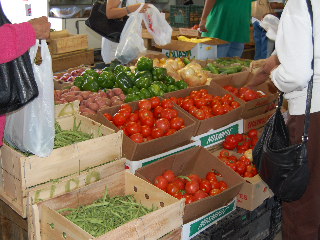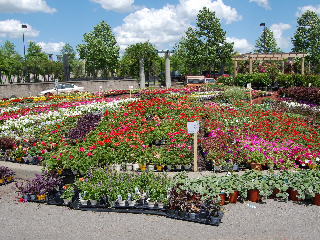
There’s probably no better place to practice the environmental awareness credo of “think globally, act locally” than at your local farmers’ market.
Here you will find lots of locally produced edible goodies, be they fresh vegetables grown organically at nearby farms, or freshly baked breads, cakes, muffins, pies, or cookies from the still-warm ovens of local kitchens.
Let’s take a look at some of the benefits of patronizing the farmers’ market.
First of all, the foods you get here will be fresher. Your local farmers are able to grow varieties that are bred for flavor and tastiness rather than varieties that are grown for their ability to withstand long periods of time in shipping and on the shelf. Many of the varieties of produce distributed to the large grocery store chains are picked and packaged long before they have started to ripen. Tomatoes and squash that you purchase in the big stores cannot possibly be at their peak of quality in terms of ripeness, freshness, and taste if they have spent more time on the road than Willie Nelson before they are even in place for your inspection and selection.
Being able to talk with the farmers who have grown the food is also a big plus in terms of finding out about their cultural methods. Do they use chemicals, pesticides, or genetically modified seeds? What is their background and how do they feel about organic farming and its effects on safe food production? Knowing where your food comes from and how it is grown and handled can be key in helping to ensure the health and well-being of your family, especially since we are dealing today with so many health issues that we still don’t fully understand, diseases that may be chemically or environmentally related or induced by the additives and preservatives in the foods we consume.

Buying locally also helps the local economy. Paying the local growers for their produce gives them money to spend and pump back into the community businesses, while it allows them to continue in their livelihood of providing more healthy foods for the people of that community. The circle of life continues.
Shopping at your local farmers’ market can even help the environment. The more locally grown food we consume, the less need there will be for foods hauled in from across the continent in large trucks spewing unhealthy emissions into the atmosphere. Also, in consuming more locally grown foods, less packaging material will have to be produced and discarded. Many times, live plants (which convert carbon dioxide to oxygen) are sold at the farmers’ market too, both annual flowers and vegetables as well as potted plants and hanging baskets of live and growing flowers.
Finally, shopping at the farmers’ market is just plain fun. Quite often, the markets have special days or festivals celebrating a particular kind of vegetable or food, complete with samplings and recipes for preparing these healthy foods. Other times, there is live musical entertainment or activities for the kids. Why not load up the family and have a learning adventure finding out about the nutritious locally grown foods and fun available at your local farmers’ market?
 There’s probably no better place to practice the environmental awareness credo of “think globally, act locally” than at your local farmers’ market.
There’s probably no better place to practice the environmental awareness credo of “think globally, act locally” than at your local farmers’ market.
 Buying locally also helps the local economy. Paying the local growers for their produce gives them money to spend and pump back into the community businesses, while it allows them to continue in their livelihood of providing more healthy foods for the people of that community. The circle of life continues.
Buying locally also helps the local economy. Paying the local growers for their produce gives them money to spend and pump back into the community businesses, while it allows them to continue in their livelihood of providing more healthy foods for the people of that community. The circle of life continues.